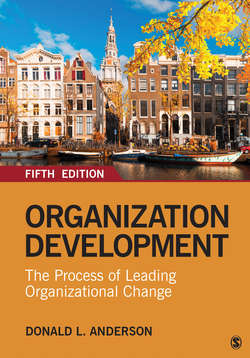Читать книгу Organization Development - Donald L. Anderson - Страница 57
На сайте Литреса книга снята с продажи.
Changes to OD Values Over Time and the Values Debate
ОглавлениеThe humanistic roots of organization development began with its foundation as a field interested in individual growth and self-awareness. OD has always had theoretical, practical, and humanistic components, with focus varying in one of these three areas at times in its history (Friedlander, 1976). Recently, however, as we discussed in Chapter 2, the movement toward organization effectiveness has taken a greater hold in OD as practitioners are more frequently asked to consult on organizationwide changes.
Two surveys of OD practitioners (one in the early 1990s, the other in 2012) can provide some insight into how OD practitioners see the importance of values to their work. In the first of these, Church, Burke, and Van Eynde (1994) found an increase in practitioners’ values toward achieving business effectiveness outcomes (such as increasing productivity, enhancing quality, or developing a competitive advantage) over traditional humanistic values (such as openness, collaboration, and other values described above). (Compared with these first two categories, practitioners ranked lower on the list those values related to the external environment, such as caring for the natural environment and enhancing corporate citizenship.) In fact, the major values in both categories (business effectiveness and humanistic concerns) were ranked almost equally in their importance to practitioners. The researchers noted that contemporary practice deals much more frequently with organizationwide, bottom-line results and that experiential activities for individuals and groups are no longer the mainstream of organization development practice.
In the follow-up survey 20 years later, Shull, Church, and Burke (2013) noted quite a few similarities in the results. Practitioners continue to be focused on business effectiveness, but not to the detriment of humanistic values. They write that “OD practitioners remain largely focused on employee welfare and driving positive change in the workplace. Humanistic values such as empowering employees, creating openness of communication, promoting ownership and participation, and continuous learning remain strong” (Shull, Church, & Burke, 2014, p. 25). Fewer practitioners reported that OD has a “touchy feely” reputation, but they also noted a perception that the traditional values of the field are weakening (a perception that was held most strongly by newer practitioners).
This business results in emphasis in organization development targets bottom-line results that can involve downsizing and job changes for individuals. Many observers have sounded a note of alarm about the business effectiveness addition to OD’s humanistic values (see Nicoll, 1998), noting that if OD were to move significantly away from its humanistic roots in favor of organization efficiency and productivity, OD would be “unrecognizable from its origins” (Church et al., 1992, p. 14) and that “a realization of this trend in the extreme . . . would mean the end of OD as a distinct field” (p. 7). However, not all agree that a focus on business effectiveness is harmful to the field of OD. Some have argued that the humanistic values of OD have adapted pragmatically to contemporary organizational challenges (Margulies & Raia, 1990) and that this is just another adaptation to needs. Others note that there may be a generational gap developing between those who have been in the field for a long time, who lament the addition of efficiency and profitability to OD’s foundational values (and the concomitant watering down of its humanistic roots), and those who are new to practicing OD, who see OD interventions as a means to help clients achieve the business outcomes they seek (Hultman, 2002). David Bradford and Warner Burke (2005) write that there is a downside to OD’s insistence on humanistic values, noting that they produce a group of practitioners advocating for their own values and who are perhaps naive about the varying circumstances in which certain values should be emphasized over others.
Implemented appropriately, humanistic concerns and business effectiveness need not be always contradictory objectives, since “we must be concerned with both the people being affected and the way in which they work (the process), as well as what they actually produce (the outcome)” (Church et al., 1994, p. 35). Ultimately, if the job of the OD practitioner is to assist the client in helping them achieve what they desire to achieve, this can be done within the broad context of OD’s core values and ethical beliefs. This is not to say that there are no challenges or tensions, however, to holding to these beliefs. For example, what is the consultant’s responsibility in helping a client redefine job responsibilities for employees who do not desire to change job tasks? The OD practitioner must hold to the conviction that achieving personal effectiveness and business outcomes are not always by necessity contradictory ends, and the practitioner must therefore learn to navigate the challenges and tensions to holding OD values, being conscious of the choices being made.
